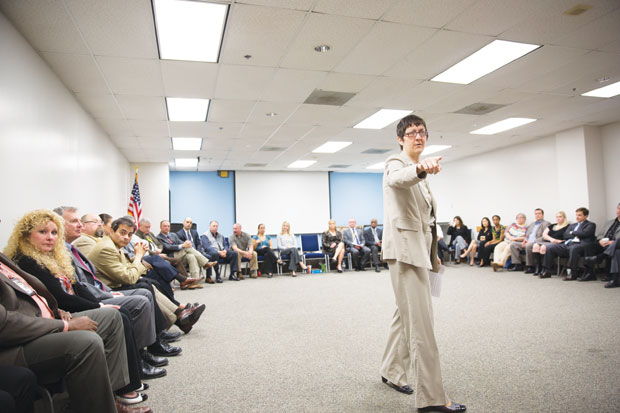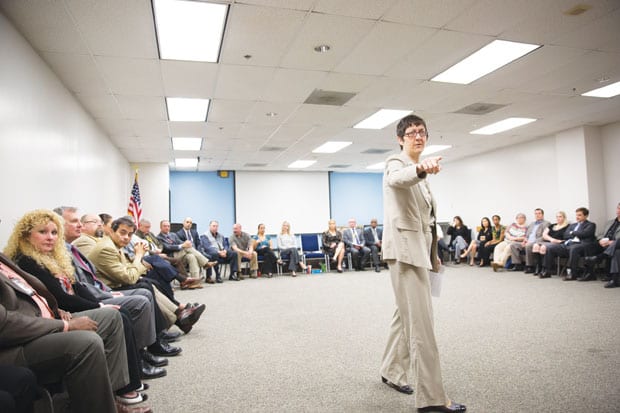DA Craig Watkins’ policies could ensure violence against LGBT people won’t go unpunished

NOH8 | The Dallas County District Attorney’s office welcomed Roberta Clark of the Anti-Defamation League to the office for a training on “Why Diversity Matters.” Nearly 300 prosecutors and investigators attended the training. (Tracy Nanthavongsa/Dallas District Attorney’s Office of Communications)
They were the words no mother wants to hear. Maria Ramos, tough ranch woman that she was, must have weakened when the Arkansas official told her that her son was injured and probably wouldn’t live through the day. It was 1985. People weren’t awakened by genial cell phone tones in those days. Instead, a 10-pound phone ringing in the early morning hours roused people like a cattle prod to the brain. The news that your son is near death would only rev that shock to a mind-splintering level.
Minutes after she hung up the phone, Maria’s bags were packed, and she was herding other family members into action. Bad news travels through Mexican neighborhoods faster than the speed of light in a vacuum, and the community circled the wagons around her. Within the hour, family friends were dropping off money to help with the trip. A couple of dollars from one, five bucks from another. Tears from all of them.
Maria and her six other children pointed their cars toward the barely rising sun. Normally, sunrises are glorious in the Texas Panhandle, but the streaks of magentas and oranges would have been lost to the family on that morning. Instead, the sun’s movement westward was only a reminder that time was running out. Doubtlessly, Maria would have prayed 10 rosaries during that tortuous drive — one for each of the hours that separated her from her dying son.
I don’t know who told Grandma what happened to my uncle, or if she knew the details before she left home or was told at the hospital. It doesn’t matter. He was brain dead, the result of a brutal gay bashing. Eyewitnesses reported that a man attacked my uncle from behind, knocked him to the ground and then kicked him in the head repeatedly.
Because. He. Was. Gay.
After the attack, my uncle was able to get up, the witnesses said, but he later collapsed. It was the last time he would walk. We soon learned the assailant had prior convictions of assault in Arkansas and Louisiana and was on probation for assault at the time of the attack. One would think it was an open-and-shut case. But not in Arkansas. And certainly not in 1985.
The district attorney should have just stayed home on the day of the trial. A first-year law student could have swatted away his feeble prosecution like a child slapping a geriatric gnat. He just didn’t care. He allowed the defense to mock the gay eyewitnesses, turning the trial into a finger-pointing at them, that they and my uncle were somehow responsible for the attack — just for being gay. They were ridiculed and humiliated, forced to divulge to their neighbors the personal details of their gay lives. They were on trial. The gay community was on trial. The only one not on trial was the defendant.
It turns out the jury didn’t care, either. Despite the eyewitness testimony that detailed the attack on my uncle, and despite the assailant’s criminal record, a dozen jurors found him not guilty. Imagine a mother being told by 12 people that her son’s life has no value to them. Indeed, as one of my aunts was later walking down the courthouse steps, she overheard someone say, “It’s just one less faggot walking the streets as far as I’m concerned.” My grandmother never recovered.
Sadly, my uncle’s story isn’t a unique one in the LGBT community. Laramie, Tyler, Paris, Dallas, Houston — this list goes on. Dallas Voice reporter David Taffet is working on a story about the Texas Obituary Project that has documented, so far, about 140 violent deaths in the community over the last several decades. How many law enforcement agencies and district attorneys buried LGBT hate crimes during those years or just determined not to prosecute them? How many mothers were told their sons’ and daughters’ lives were of no value to the legal system because they were LGBT? Too many.
Dallas County District Attorney Craig Watkins agrees. Watkins announced in February the creation of the Dallas County District Attorney’s LGBT Task Force, and in March nearly 300 of his prosecutors and investigators took part in sensitivity training, titled “Why Diversity Matters,” that will help them better understand the county’s diverse communities.
“The diversity training will benefit our office and the residents of Dallas County as a whole,” Watkins said. “We are better prosecutors, better investigators, when we understand the communities that we serve. Not only will it provide us a better understanding of the people we must prosecute, but equally with the victims and witnesses of crimes.”
Watkins said he’s aware that many LGBT people are reluctant to report crimes committed against them. Their experiences with law enforcement officials haven’t always been good, and as one trans woman recently reported, police officers in Paris told her “Being the way you are, you should expect that” treatment, after she reported to them she was receiving death threats in the East Texas city.
Watkins certainly sees a lot of hate. It’s even been directed at him, Dallas County’s first African-American DA, and as he steers his office toward an understanding of diversity, he’s liable to see more.
“My role is very controversial,” he said, “but I’m going to live up to the principles I believe in. I’ve seen people use their power to hold people back from living the American dream. It’s impossible to change this office overnight, but I am going to set the standard of behavior of what the justice system should be.”
Watkins’ creation of the LGBT Task Force and putting his staff through diversity training could stop the rise in anti-LGBT hate crimes. The FBI and the National Coalition of Anti-Violence Programs report an increase in those crimes, and the breakdown is horrifying. Transgender people and gender non-conforming people continue to experience higher rates of homicide. LGBTQH (lesbian, gay, bisexual, transgender, queer and HIV-affected) people of color represented 53 percent of total reported survivors and victims of all hate crimes, but 73.1 percent of homicide victims.
Watkins said he’s an advocate for change and the Task Force and training will have a ripple effect in his office and in the county. He also believes it will reach the community.
“We’re already seeing it,” he said. “Many LGBT people don’t believe in law enforcement because it hasn’t worked for them. They’ve been marginalized.”
My grandmother, gone for 19 years now, would have loved to hear those words from a district attorney. The Task Force — comprised of four attorneys, an investigator, a case worker, a victim advocate and a spokesperson — will now help ensure no one in the community is excluded from the judicial process. And when LGBT people are on the defendant’s side, they are being told they can expect to face a more understanding prosecutor.
No members of the LGBT community are on the Task Force, but James Tate, LGBT spokesman, said, “We are exploring a future date and time to conduct a town hall meeting. In essence, this would allow us to introduce ourselves to the community and let them know we are here to help.”
Three of the Task Force members identify with the LGBT community, but no members of the community are on it because there will be cases that potentially come before the Task Force that can be viwed only by the district attorney’s office.
As Watkins finishes the last year of his second term, he reflects on how the job has changed him. He earned five times the amount of money in private law practice than he does as the district attorney.
“But I was unhappy,” he said. “I’m happy now. I’m very religious, and I read the Bible. We are all children of God, whether you’re LGBT or a member of any other community. In my office, we need to protect everyone.”
That sentiment did trickle down to the prosecutors in Watkins’ office.
“In some way, almost all of us are minorities,” said Brian Higginbotham, an assistant district attorney in the appellate division. “It may be gender, race, ethnicity, sexual orientation, religion, disability or many other things. As prosecutors, we see all kinds of people at their worst and at their best.”
In our fight for marriage equality, Watkins said, “the Constitution says you have the right to marry.” And he encourages LGBT people to marry “even if it means you’re hauled off in handcuffs.”
“Live your life the way you want to,” he advised.
Twenty-nine years ago, my grandmother saw prosecutors at their worst, but I’m hopeful that I’m now seeing one at his best. The community will hold Watkins’ to the message drawn on his cheek for the NOH8 picture. It’s a powerful symbol for a powerful office, and it’s high time for the changes promised to us.
If members of the community have a concern they want to discuss with the Task Force, they can send an email to lgbt@dallasda.com.
This article appeared in the Dallas Voice print edition April 18, 2014.














